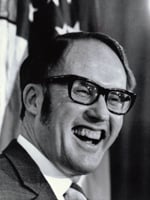Meet The William Rehnquist You Didn't Know

Photo by AP images
Almost every week, from the late 1980s until his death from thyroid cancer in 2005, U.S. Chief Justice William H. Rehnquist was in touch with Herman J. Obermayer, a former editor and publisher of the Northern Virginia Sun daily newspaper. Late in their lives, after a chance encounter on a tennis court, the two became the best of friends. This unlikely association between the journalist and the justice gave Obermayer a unique window into a very private man.
Bill Rehnquist’s public demeanor and appearance were best described as unexceptional. Good-looking but not movie-star handsome, he stood out in a crowd chiefly because of his height: 6 foot 2. The wisps of hair surrounding his baldness had a brownish-rusty hue. Always careful about his diet, he never became paunchy. He wore large-lens, fashionable glasses, and his easy laugh showed a mouth full of old-fashioned gold crowns. He dressed appropriately but uninterestingly: button-down shirts, unobtrusive ties, Hush Puppies-type shoes, work pants (but never jeans) on weekends, and off-the-rack suits that he usually bought from lower-end mall haberdashers.
A hearty greeting accompanied a weak handshake. At belly-laugh movies, he had no reticence about audibly guffawing. While his lifelong back problems did not seriously compromise his posture, he was slightly pigeon-toed and walked with a discernible lope.
Bill welcomed gossip about mutual friends and colleagues. The social isolation forced on him by his exalted position meant that only rarely was he able to enjoy exchanging juicy tidbits about members of the judicial and social communities of which he was a part.
He lived far below his means. Stock and bond investing bored him. Other than his two modest homes, at the time of his death his entire estate consisted of $708,689 in savings accounts at banks a few hundred yards from his Arlington, Va., townhouse. His neighbors were law firm associates and middle-level civil servants. Ostentation offended him.
Those who were able to pierce the hard outside shell that hid Bill Rehnquist’s character and personality discovered a quick-witted man who cherished abiding friendships, admired personal loyalty and empathized with other people’s travails. He was obsessively frugal, annoyingly punctual, endlessly curious and addicted to cigarettes.
Continue reading “The William Rehnquist You Didn’t Know” online in the March ABA Journal.



